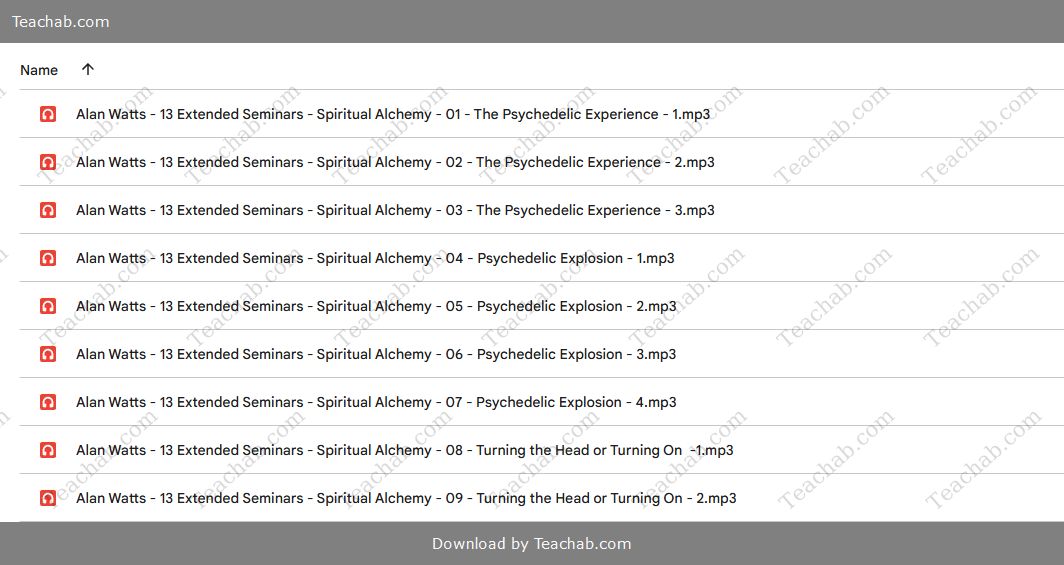Spiritual Alchemy
by Alan Watts
Get Spiritual Alchemy by Alan Watts Digital Download!
You can check proof of content here

Spiritual Alchemy by Alan Watts
Overview

Discovering the Transformative Nature of Spiritual Alchemy Through Alan Watts
Alan Watts, the influential British philosopher and prolific author, is renowned for weaving together Eastern and Western spiritual thought. In his interpretation of spiritual alchemy, Watts delves into the deep potential for inner growth and spiritual evolution. His insights reflect the symbolic process of traditional alchemy—not in a literal sense, but as a powerful metaphor for personal transformation. Through his work, Watts explores how consciousness connects to the broader cosmos, offering teachings that are both timeless and relevant to modern seekers.
In his teachings on spiritual alchemy, Watts emphasizes the journey toward greater awareness and self-realization. He contends that true transformation isn't about material results, as with the classical alchemist’s goal of turning lead into gold. Instead, the real gold lies in a radical internal change—the unraveling of the ego and the recognition of one’s unity with the universe. This interpretation aligns closely with core ideas found in Zen and Taoist traditions, which Watts translates for a Western audience with clarity and depth. His guidance helps readers let go of the illusion of separateness, fostering a deeper sense of connection to all of existence.
Shedding the Ego: The Core of Transformation
Watts underscores that genuine spiritual insight goes beyond intellectual learning—it involves a profound shift in one's state of being. Central to this transformation is the dissolution of the ego, which he sees as the main obstacle to realizing our inherent connection with the universe. By transcending this limited self-view, individuals can awaken to the realization that their existence is inseparable from the whole.
He likens this process to the ancient idea of alchemical transformation, where raw matter undergoes a dramatic shift to reach its highest form. Yet, rather than focusing on physical elements, Watts highlights practices such as meditation and deep introspection as essential tools for transformation. These techniques allow individuals to quiet the mind, turn inward, and discover the deeper truths of who they really are.
Altered States and Spiritual Awakening
An intriguing aspect of Watts’ spiritual teachings involves his exploration of altered states of consciousness. He notes that these experiences—whether brought about through psychedelics or deep meditative practice—can offer powerful insights similar to those reached after years of dedicated spiritual work. In his essay The New Alchemy, Watts compares the revelations of altered states to glimpses of enlightenment traditionally sought through prolonged effort.
Still, he cautions against relying on these experiences as quick fixes. Watts stresses that while they may offer a glimpse into higher awareness, sustainable growth comes from consistent practice and inner discipline. He advocates for a thoughtful and grounded spiritual path, encouraging seekers to engage fully in the lifelong process of self-discovery rather than chasing fleeting moments of clarity.
The Universe as a Joyful Dance
One of Watts’ most compelling ideas is his portrayal of the universe as a spontaneous, playful existence. He presents life not as a problem to be solved, but as a dance to be enjoyed. This metaphor invites people to be present, to stop striving endlessly for achievement, and to instead participate in life with openness and joy.
In this framework, life is seen as a process to be experienced rather than a goal to be reached. Just as a musician plays not to finish a song but to enjoy the music itself, Watts encourages individuals to savor their lives moment by moment. By embracing this attitude, people can discover fulfillment in the ordinary, finding beauty and meaning in the present rather than in some distant outcome.
Mindfulness and Conscious Living
Watts places great value on mindfulness as a key element of spiritual transformation. By fostering awareness of each moment, individuals can uncover insights that help them align more closely with their true nature. This presence also nurtures a sense of connection to all living things, deepening compassion and empathy.
Drawing from traditions such as Zen and Taoism, Watts describes mindfulness as a heightened attentiveness to one’s thoughts, feelings, and surroundings. Scientific research supports this view, showing that mindfulness can reduce stress and enhance well-being. For Watts, these practices are more than self-help tools—they are gateways to a richer, more conscious way of being that aligns with the natural rhythm of the universe.
Welcoming Life’s Complexity
What sets Watts apart is his embrace of life’s uncertainties and paradoxes. Rather than seeking to eliminate complexity, he encourages people to accept and engage with it. This mindset fosters flexibility and emotional resilience, especially valuable in a world that often feels chaotic and overwhelming.
Watts’ approach invites a new relationship with life’s challenges. He suggests that difficulties are not just obstacles but opportunities for growth. In an age marked by information overload and pressure to conform, his philosophy offers a grounding perspective—one that encourages inner strength, curiosity, and open-hearted exploration of the unknown.
Final Thoughts: A Lifelong Path of Awakening
In conclusion, Alan Watts’ interpretation of spiritual alchemy serves as a timeless guide for those seeking inner transformation. He reimagines ancient alchemical ideas through the lens of personal growth, urging readers to embrace mindfulness, curiosity, and presence as tools for spiritual evolution. With his unique blend of humor, insight, and poetic wisdom, Watts continues to inspire those navigating the complexities of existence.
He reminds us that life’s richness comes not from reaching a final destination, but from fully engaging with the journey itself. By shifting our focus from outcomes to experience, we can rediscover the joy of being. Watts’ teachings suggest that transformation is not a single moment, but an ongoing unfolding—one rooted in connection, awareness, and love for the universe we are inherently a part of.
Related products

Making Contact, Satir Process, Personal Workbook, Forgiving Parents PDF bundle
by Virginia Satir
$100.00
$38.50

Overcome Neediness, Attachment, Fears (Audio Seminar)
by Apollonia Ponti
$129.00
$15.40


